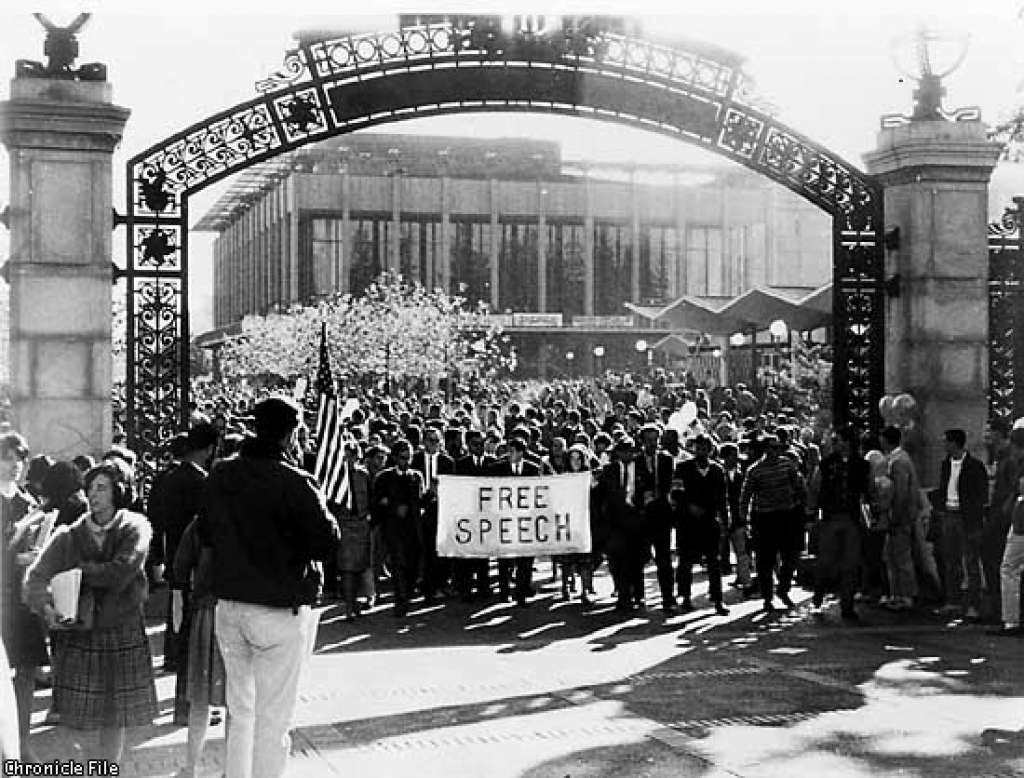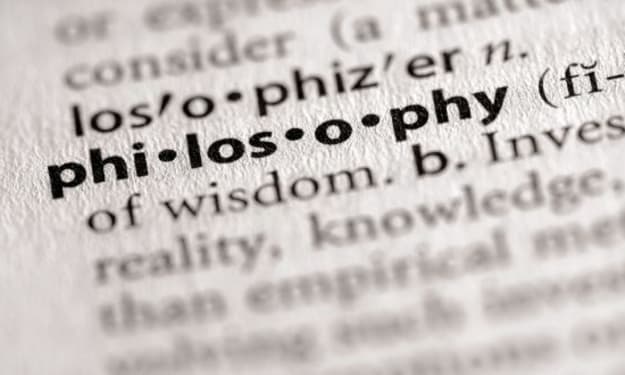Free Speech and the New Left
The transition from protectors of free speech to bigotry.

In 1964, the University of California Berkeley was engaging in what would come to be known as The Free Speech Movement. During this time subversive ideas were plentiful, though not all embraced, especially by federal and local law enforcement. At the same time, a mass of students at UC Berkeley were engaged in passively handing out civil rights literature in an attempt to challenge the status quo. While this would be seen as perfectly acceptable by most standards today, Hollander Savio spoke to NPR News about how contemptible these acts were at the time by law enforcement. According to NPR News, Savio recalls that she watched a former mathematics graduate student being arrested for distributing civil rights literature (Gonzales). Fast forward to circa 2016, so called “safe spaces” are being advocated, or more appropriately characterized as demanded, by the New Left. Safe spaces as defined by The Chicago Tribune are areas which serve to shelter students from speakers and/or topics that may be traumatizing, uncomfortable or offensive (Rhodes, Vivanco). One should be shocked that this censorship and disabling of free speech and open discourse comes from the “descendants” of the Berkeley Free Speech Movement. Not only has the New Left abandoned one of the Old Left’s defining historical moments, it’s abandoned the idea that free speech is in place to protect a citizen’s right to speak openly about unpopular ideas and that that same right should be granted to all citizens without prejudice.
Fifty years after The Freedom of Speech Movement at UC Berkeley, the antithesis of this historical moment would show its face. In 2017 Milo Yiannopoulos, a conservative provocateur, was invited by university leaders, only to have the scheduled speech cancelled two hours before. According to the Los Angeles Times, “a group of violent protestors from off campus shut down the speech” causing $100,000 in damages to the campus (Watanabe et al.). While the LA Times states that students did not participate, that’s beside the point. According to The Atlantic, over 40 universities restrict freedom of speech to some extent. Additionally, students at Wesleyan University “trashed their student newspaper then pushed to get it defunded because they disagreed with an op-ed that criticized Black Lives Matter” (Friedersdorf). Lastly, according to The Atlantic, the following colleges have either cancelled an invited speaker, attempted to cancel an invited speaker or required police intervention due to civil unrest: Harvard Law School, Kean University, Williams College, Duke University, UC Berkeley, USC, Texas Tech., St. Louis University, Princeton University, Dickinson School of Law and NYU Law School (Friedersdorf). If American campuses had a few anti-free speech anomalies, that would be one thing, but clearly there are a profusion of them.
One of many colleges that have been left out of the aforementioned list includes the University of Massachusetts (UMass). In 2016, popular YouTube conservative podcaster and comedian Steven Crowder was co-paneling an event titled “The Triggering”, along with Milo Yiannopoulos and Christina Sommers on the UMass campus. The previously mentioned speakers were invited by the local Republican Party club at UMass to speak on a variety of issues concerning the New Left. Before Milo Yiannopoulos or Christina Sommers could make their opening remarks, boos and taunts ensued from audience members, at which time Steven Crowder decided to start his opening remarks. One of the many remarks Crowder directed towards the intolerant audience was, “You people are openly and completely against [freedom of speech] - you’re not fighting for free speech, you’re not fighting for rights, you’re fighting for the right to [...] hear opinions that you don’t like!” (qtd. in Kirchoff). This was said as college campuses were vehemently galvanizing fellow students and faculty into rejecting dissenting opinions on the premise that one should be protected from offensive, uncomfortable or differing views, going so far as to verbally shut out multiple speaker’s opinions at a panel they were invited to.
While I would contend that safe spaces in these contexts are not appropriate and are damaging to free speech and encouraging of censorship, I would not consider myself an opponent of all safe spaces. A therapist’s office for example should be a safe space that no one can take away from you by claiming that you’re being too sensitive. This example compared to designated areas on a college campus where students can assemble to avoid unwanted opinions which may be offensive are two completely different ideas. The former is an area that (polite) society has deemed sensitive to certain topics and one should tread lightly due to the the nature of the setting, though some may decide to toss this strong societal suggestion aside. The latter is an area where large groups of a various cultures and backgrounds come to learn and share ideas, creating safe spaces here is diametrically opposed to what it sets out to accomplish. Students do not go to college to remain in a bubble of their own narrow-mindedness, instead, students attend college to become more open to conflicting opinions, backgrounds, cultures, etc., and above all else, to learn. How can students do this when people of varying opinions are not allowed to express those opinions?
As I demonstrated previously, there should be a certain degree of nuance to safe spaces and the same is true of free speech. While one should be able to march down the street and proclaim their contempt for Jewish culture, one should not be able to march down the street and proclaim their contempt for Jewish culture while at the same time calling for violent action against them. I would argue that this is where the New Left makes their mistake. At the UMass “The Triggering” panel, a female student can be heard chanting “Keep your hate speech off of campus!” (FOX News "Gutfled: This is what passes for free speech on campus"). Hate speech is defined as speech which attacks a person or group of people on the basis of attributes such as: gender, ethnic origin, nationality, race, sexual orientation or disability. I would contend that there is an immense difference between speech that attacks a person or group of people (even if it’s morally or socially wrong) and physical action or a call for physical action against a person or a group of people. Instead of outright banning certain ideas from being discussed or advocated for, the side that is so vehemently against the other expressing their right should ask thought-provoking questions that dismantle the other side’s argument.
One may argue that allowing hate speech to be protected under the First Amendment is not correct in-and-of-itself as it may promote violent action against a person or group of people, even if the speech isn’t calling for said action. While this is a problem and should be dealt with when the issue arises, this can be applicable to anything from a racist speaker proclaiming non-whites to be inferior, to a political rally about manufacturing jobs being sent overseas to cut down on cost. A speaker should not be liable for the actions of others simply because a group interpreted his message as indirectly suggesting violent conduct. However, if a speaker directly suggests or demands a person or group of people incite violence, the speaker should be held liable. Lastly, I would argue that the New Left’s goal in censoring hate speech would perpetuate hate speech. To decide a specific area of discourse should not be allowed, you are protecting that very area from scrutiny and counter-arguments. Indeed, censoring radical opinions tends to lead to radical action by providing the radicalists with a platform to boycott your governance. If radical ideas are not permitted in public discourse, radical action will follow to garner attention to their cause.
The Old Left fought tenaciously at the University of California-Berkeley to legitimize radical freedom of speech in 1964. Today, the New Left fights tenaciously to shelter people from unpopular opinions, of which some may create discomfort or offend someone. Instead of engaging with radicals, the New Left would much rather silence these offensive or uncomfortable ideas. Instead of providing thought-provoking questions to radicals, they perpetuate their ideas by disallowing a free and open discourse to dismantle them. One should be shocked that this censorship and disabling of free speech and open discourse comes from the “descendants” of the Berkeley Free Speech Movement. Not only has the New Left abandoned one of the Old Left’s defining historical moments, it’s abandoned the idea that free speech is in place to protect a citizen’s right to speak openly about unpopular ideas and that that same right should be granted to all citizens without prejudice.
Works Cited
Friedersdorf, Conor. “The Glaring Evidence That Free Speech Is Threatened on Campus.” The Atlantic, 4 March, 2016, https://www.theatlantic.com/politics/archive/2016/03/the-glaring-evidence-that-free-speech-is-threatened-on-campus/471825/, 21 March, 2017.
Kirchoff, Courtney. “Steven Crowder Delivers Most Epic Smackdown of Leftist Protestors Ever.” Lowder With Crowder, 26 April, 2016, http://louderwithcrowder.com/crowder-delivers-most-epic-smackdowns-of-leftist-protestors-ever/, 21 March, 2017.
Park, Madison. “Berkeley protests of Yiannopoulos caused $100,000 in damage.” CNN, 2 Feb., 2017, http://www.cnn.com/2017/02/01/us/milo-yiannopoulos-berkeley/, 21 March, 2017.
Vivanco, Leonor. “U.C. tells incoming freshman it does not support ‘trigger warnings’ or ‘safe spaces’.” Chicago Tribune, 25 Aug., 2016, http://www.chicagotribune.com/news/local/breaking/ct-university-of-chicago-safe-spaces-letter-met-20160825-story.html, 21 March 2017.
Watanabe, Teresa. “UC Berkeley - home of the free speech movement - finds itself under fire from left, right and Trump.” Los Angeles Times, 2 Feb., 2017, http://www.latimes.com/local/lanow/la-me-uc-trump-speech-20170202-story.html, 21 March, 2017.
About the Creator
Kent Prion
I am currently pursuing my MS in mathematics, with hopes to immediately matriculate to a PhD program in mathematics. While my main interest revolves around mathematical ideas and research, I enjoy writing about a myriad of topics.






Comments
There are no comments for this story
Be the first to respond and start the conversation.